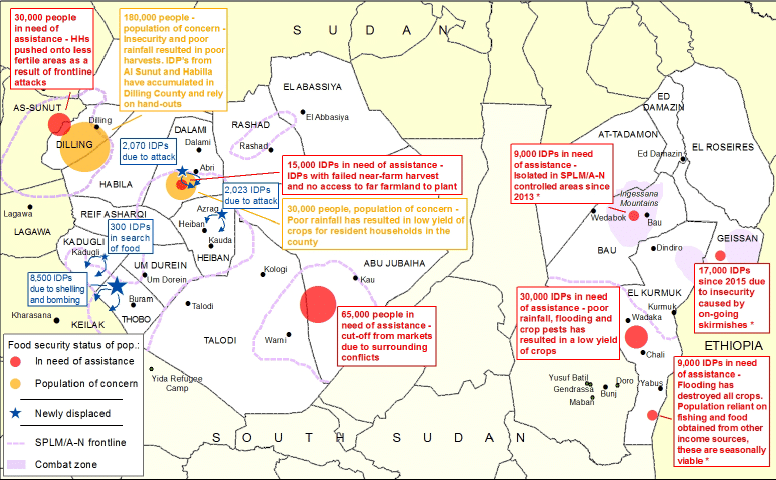Help our local partners realise their vision of hope for their communities

HUMANITARIAN UPDATE – March 2016
South Kordofan and Blue Nile states, Sudan
Produced by the South Kordofan and Blue Nile Coordination Unit
The full update is available as a download below.
The government’s dry season offensive has begun in the Two Areas during the reporting period, later than expected (last year’s offensive started as early as December). Ground fighting, aerial bombardment and shelling has provoked significant internal displacements and increased humanitarian needs throughout the two states, against a backdrop of already severe food insecurity.
The most affected areas are Kurmuk county in Blue Nile, with 14 aerial bombardments and at least 96 bombs, and Heiban and Dalami counties in South Kordofan, where 146 bombs were dropped in 30 separate incidents. In the state, long range shelling from both sides was also recorded, mostly in Heiban and Kadugli counties where most of the offensive was concentrated.
As a result of the attacks, at least six deaths were confirmed by humanitarian monitors, of which 2 were children, and twenty four injured, including 6 children, in South Kordofan. Three people were injured, one of them a 9 month old baby, in Blue Nile. A number of animals were also killed, affecting an important source of livelihood for the population. At last count, at least 12,893 new IDPs were recorded by humanitarian monitors in South Kordofan.
The humanitarian impact of the conflict continues to put pressure on an already exhausted population, more so for the newly and previously internally displaced. Coping mechanisms are significantly constrained, as insecurity has hindered trading and income generating opportunities. While in a normal situation food stocks would run out in August, in most payams, food stocks are quickly being depleted, according to humanitarian monitors. In parts of Habila, As-Sunut and Kao-Warni-Nyaro, in South Kordofan and parts of Chali Al-Fil, Wadaka and Yabus payams in Blue Nile, food stocks have already run out. According to CU monitors, at least 173,000 IDPs are severely food insecure in the Two Areas and an additional 210,000 are at risk in the coming months.
It is essential that humanitarian assistance (cash, food, medicine, seeds) reaches these communities ahead of the rainy season (May/June) when road accessibility becomes limited.